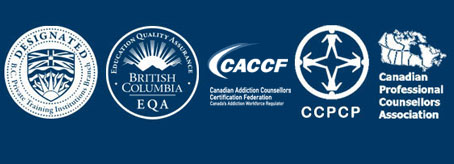Youth and Family Counsellor Training

CYF-400, Collaborative Youth and Family Counselling
The course in a nutshell:
Discussion Topics: Offers training in the delivery of a collaborative counselling program applicable to children, adolescents and families. It is a step by step program based on 4 development stages- behavioral; emotional; social; academic. Children experiencing deficits in one or more of these stages may exhibit acting out behaviors or internalized emotional problems.
Skills: You’ll learn to collaborate with parents in assessing presenting issues of children, adolescents and families; customize appropriate treatment strategies; and facilitate a structured counselling program in various formats including individual and family counselling, and parenting groups.
COURSE CONTENT:
The Collaborative YFC course is designed for students who wish to develop proficiency in the use of a collaborative approach to assessing and treating behavioral and emotions problems in children and adolescents and addressing parental concerns.
The course content includes theory and applied skill development in the following topics:
- Common indicators of psychological disorders that may be manifest in acting out behaviors.
- A four module counseling program geared to parents and children (ages 5-17).
- Theory and techniques to address problems in 4 basic areas of development.
- The effects of delayed or regressed behaviors during key developmental stages.
- The impact of cultural, genetic and psycho-social variables that influence parenting styles, and family values.
- Various counseling skills specific for treating children and adolescents such as building trust, advanced empathy, active listening, filial and play therapy, problem solving, art and music therapy.
- The impact of various childhood disorders such as learning disabilities, anxiety disorders, and developmental disorders on a youth’s self-esteem, social and academic functioning.
- The limits of confidentiality, ethical and legal implications of working with children, youth and parents.
- Various parenting theories, psycho-educational programs and counseling skills specific to working with parents.
- Review of the DSM-V diagnostic criteria for Disorders found in Infancy, Childhood and Adolescence.
- Safety protocols for working with children, adolescents and parents.
- Working within the scope of practice; the need for supervision and/or professional consultation; and appropriate referrals.
PORTFOLIO OF JOB SKILLS
What you will learn:
Collaborative YFC expands opportunities for students to learn and apply therapeutic skills to help children and adolescents develop a healthy sense of self in family, social relationships, and in their educational environment.
Your level of proficiency and competence with the skills introduced in the Collaborative YFC course will deepen as you proceed through your program of study.
Upon graduation from the Diploma or Certificate program, you may include the following skills as part of your Professional Portfolio:
- The ability to assess for and recognize symptoms of psychological, cognitive and behavioral disorders that may manifest in acting out behaviors of children and youth.
- The ability to assess for and recognize common indicators of delayed developmental tasks in children and youth.
- The ability to utilize forms and worksheets designed to: improve developmental skills in children and adolescents; gather information for the assessment and treatment plan; provide informed consent; limits of confidentiality; set goals; and provide information to parents.
- The ability to facilitate a structured program designed for parents and children (ages 5-17). Students learn techniques to assess and treat behavioral and emotional problems which can be used in individual, family and group counselling.
- The ability to incorporate cultural sensitivity when counseling parents, children and adolescents.
- The ability to incorporate counseling skills such as trust building, advanced empathy, active listening, and play therapy when working with children.
- The ability to utilize techniques appropriate for adolescents such as trust building, empathetic listening, problem solving, art and music therapy.
- The ability to incorporate DSM-V diagnostic criteria for Disorders found in Infancy, Childhood and Adolescence into the assessment, referral, and treatment planning process.
- The ability to apply counseling techniques within the scope of practice of the counselor which is specific to various childhood disorders such as learning disabilities, anxiety disorders, and developmental disorders relating to damaged self-esteem, unresolved losses, and acting out behaviors and family conflicts.
- Proficiency with various parenting theories, and the ability to develop and deliver psycho-educational programs or counseling services for parents.
- The ability to counsel children, teens and their parents in a family setting using a variety of professional techniques including: role plays, art and play, journal writing, cognitive restructuring, conflict resolution, and behavior modification.
- Understanding the limits of confidentiality and legal implications when working with children and adolescents; when and how to report incidents of suspected abuse, and assess for suicidal risk and apply a “no-harm contract”.
- The ability to work within the limits of your scope of practice; the need for supervision and/or professional consultation; and how to make appropriate referrals.
(NOTE: The skill set you will learn in this course comprises areas of core competence required for the practice of professional counselling.)






